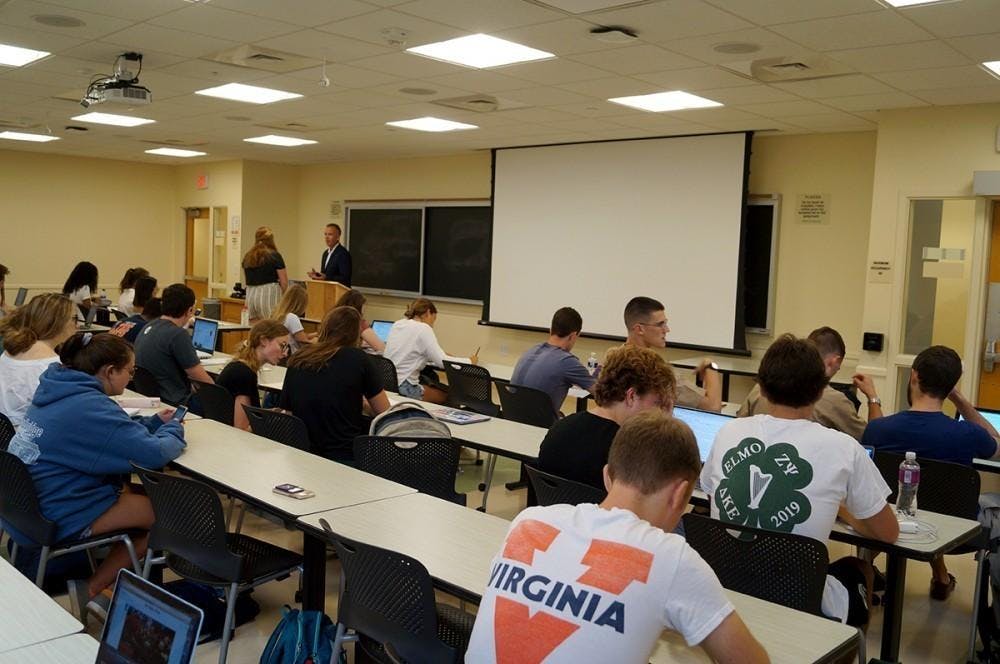An initiative on Grounds called Cavalier Education — run by Student Council — is putting classroom power in students’ hands. Students can design and teach their own one- or two-credit classes, which are then registered in the Student Information System for other students to enroll in.
CavEd courses are taught in the spring by students who applied to the program, which will open in late October. The program is limited to eight courses per semester, and up to four students can teach one course.
Hiba Khan, CavEd program co-director and fourth-year Batten student said that CavEd offers a unique opportunity for students drawn to teaching.
“The fact that they’re taught by students, and designed and structured almost entirely by students with help from a faculty advisor, I think that’s unique because students are able to teach classes that they believe others would benefit from,” Khan said.
The student directors of the program said that CavEd’s potential for growth lies in its flexibility and creativity. Rather than recreating conventional classes, students can imagine courses that sit outside the bounds of traditional majors.
Topics range widely, from politics and culture to self-growth and mindfulness. One such course is “The Transformative Power of Kindness and Gratitude,” which was previously taught by fourth-year College student Navya Aenugu.
“I was really interested in teaching students something that isn’t a traditional school subject,” Aenugu said. “Kindness and gratitude are core values of mine, and I thought, why not convey that to others and help them impact Grounds, while also fulfilling my excitement to educate?”
Aenugu said she developed her course syllabus based around guest speakers and partner work, with students pairing up to work on some assignments together.
Other courses focus on the sciences. Fourth-year College student David Dzul said he saw an opportunity for a course exploring the intersection of science and society, so he decided to make one himself.
“I really wanted to know more about the role science plays in society,” Dzul said. “I didn’t feel like there were courses available for this sort of knowledge, so I sought CavEd and crafted a course that really plays on the populism of pseudoscience.”
Before applying, students must have taken INST 3150, the CavEd Pedagogy Seminar, a one-credit class which meets once per week. The course is taught each fall, ahead of the application for CavEd. The seminar’s professor Adriana Streifer said the seminar focuses on helping prospective instructors develop the skills and mindset they’ll need in the classroom.
“We use a process called backward design. Backward design prompts anyone who wants to teach a course to think in substantive and reflective ways about the long-term goals that they have for their students’ learning,” Streifer said.
She added that this method attempts to turn students’ myriad ideas into tangible results for future instructors.
“Students will be able to articulate actionable learning objectives for any course that they want to design. They will be able to create assignments that align with those objectives, drawing on principles from evidence-based and inclusive teaching practices,” Streifer said.
The format of Cav Ed courses also allows instructors to merge their personal experiences with research and scholarship, an approach that participants say makes the classes far more relatable. Anjana Rajesh, CavEd program co-director and fourth-year College student, said that the courses give students an opportunity for advocacy.
“You’re able to teach things you’re passionate about in any topic. It gives students the power to spread awareness about things they care about at U.Va.,” Rajesh said.
One limitation of taking CavEd courses is that they only offer one or two credits, and do not count toward major or minor requirements. Still, Khan said that the low credit amount can be a benefit to students with busy schedules.
“A lot of these [courses] are super unique and not already offered. They’re interesting classes you wouldn’t expect to see taught at U.Va., so it allows students to explore personally interesting topics without overloading their schedules,” Khan said.
As a student, Aenugu said that there are challenges to teaching a CavEd course to other students.
“The first [challenge] is at the end of the day, I'm just a U.Va. student, and nothing makes me more qualified than anyone else in the room to be up there and teaching, because I don't have a degree the way other professors do,” Aenugu said.
The application process for CavEd is demanding, as hopeful instructors must take the seminar class, submit a detailed course syllabus, obtain a faculty sponsor who can recommend the course and assist with writing a syllabus. Students then must present to Student Council’s Academic Affairs Agency before their course can appear on SIS for enrollment.
Khan said that the process to design the course, including the prerequisite seminar, is the biggest hurdle. Still, those who succeed say the experience reshapes how they view higher education itself.
“The biggest takeaway I have from instructing is that every syllabus is different and done intentionally. Professors put their own spin on it, but student instructors have the chance to relate and utilize their understanding to enhance education,” Dzul said.
While the program is fully up and running, Rajesh said there is still room for growth.
“We want to make the program more open, more available and easier for people whose course loads are high to apply. Making the seminar course more accessible, and publicizing the application earlier, would help interested students get involved and share their passions,” Rajesh said.
Applications open Oct. 21, and are due Oct. 28. Students will then be selected for an interview before being chosen Nov. 1. More information can be found on the CavEd website.







